Transforming Our Food Systems Through Transdisciplinary Research - Inside the Center for Sustainable Food Systems
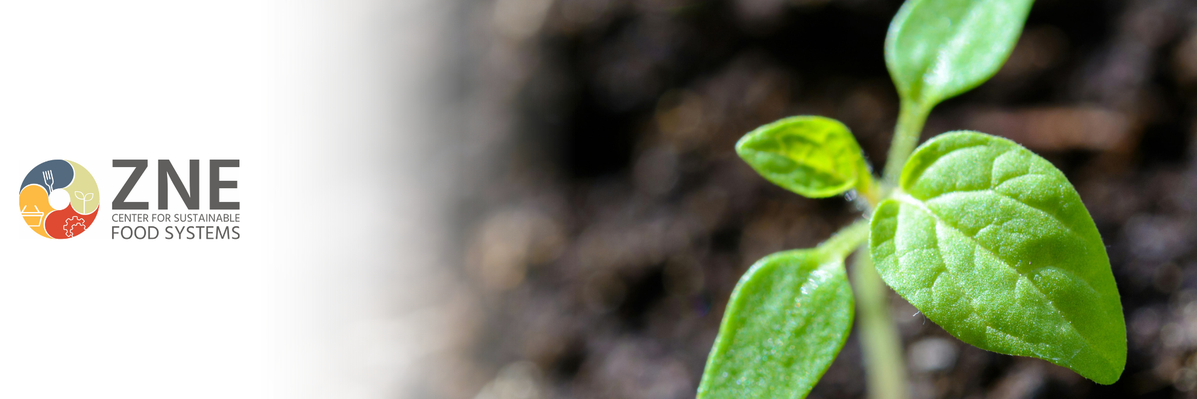
- regional, national and global perspectives
- multi-, inter- and transdisciplinary cooperation
- networking with non-university research institutions and actors
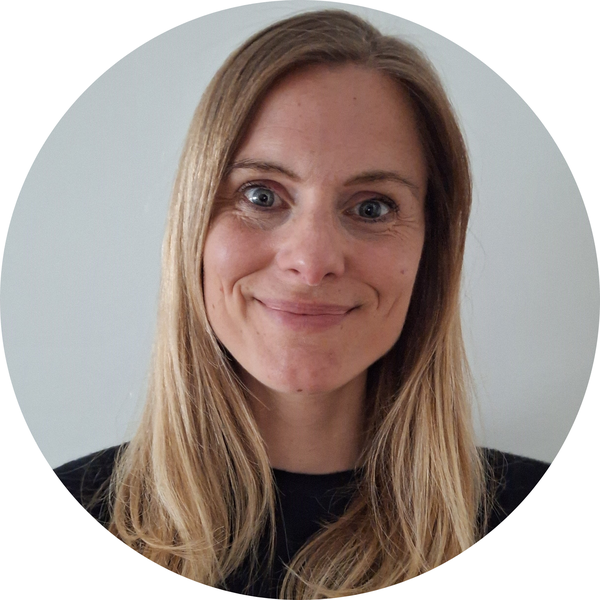
“Food system transformation refers to the transition toward more sustainable food systems capable of addressing both current and future challenges. Contemporary food systems face critical environmental pressures, including climate change and biodiversity loss, alongside health challenges associated with diet-related diseases. Reducing the consumption of animal products and promoting plant-based diets represent key pathways to lowering environmental impacts, improving public health, and fostering overall sustainability.
To explore these and other potential transformation pathways, a systemic and transdisciplinary approach is required—one that integrates the knowledge and perspectives of both academic and non-academic actors. This is precisely the mission of the ZNE: to bring together researchers and stakeholders from industry, civil society, and policy domains to jointly address the complexities of transitioning toward sustainable food systems.”
Prof. Dr. Ramona Teuber, speaker of the ZNE Executive Board and head of the Chair for Agricultural and Food Market Analysis at JLU Giessen
The ZNE Approach to Sustainable Food System Research
The members of the ZNE are organized around five key ares. With each member, expertise in the entire food system is expanded, enabling research into healthier, more socially acceptable, environmentally sustainable, and animal welfare-friendly food systems.
 |
 |
 |
|
|
| Resources & Production | Processing |
Retail & Market |
Consumption |
Institutional environment |
|
Interdisciplinary expertise |
Innovation transfer into practice |
|
|
Processing
|
Interdisciplinary expertise |
Innovation transfer into practice |
|
|
Retail and Market
|
Interdisciplinary expertise |
Innovation transfer into practice |
|
|
Consumption
|
Interdisciplinary expertise |
Innovation transfer into practice |
|
|
Institutional Environment
| Interdisciplinary expertise | Innovation transfer into practice |
|
|
Learn more about research at the ZNE here
Current Research Projects of the ZNE Members
ZNE members are involved in research activities across a broad range of disciplinary and local contexts, aiming to analyze existing food systems, drive innovation, and support the food systems transformation. Learn about three ongoing projects with ZNE affiliated researchers below.
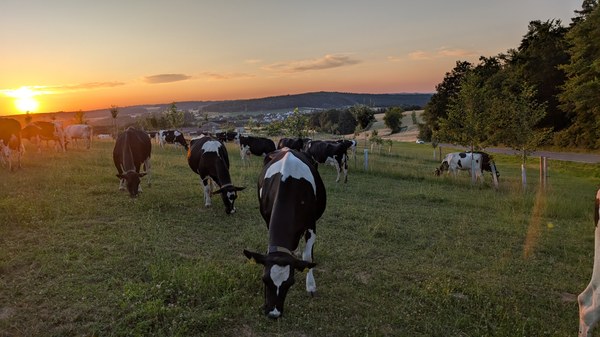
GreenDairy
GreenDairy is a LOEWE priority programme funded by the Hessian Ministry of Science and Research, Art and Culture (HMWK) and is an excellent example of food system research in Germany. Focusing on integrated animal-plant agroecosystems, GreenDairy aims to conduct comparative research on agricultural systems for low- and high-input milk production.
The programme’s primary objective is to develop innovative, ecological livestock farming systems that are both ecologically and economically sustainable, enable a special degree of animal welfare and thus enjoy wide-spread social acceptance. GreenDairy brings together a multidisciplinary team of leading scientists to cover all aspects of integrated plant-animal agroecosystems, from crop and livestock levels to the environmental impact and socio-economic aspects of innovations in organic farming.
Scientific and administrative lead coordination:
Prof. Dr. Andreas Gattinger, Chair of Organic Farming, ZNE, JLU Giessen
Prof. Dr. Lutz Breuer, Chair of Landscape Ecology and Resource Management, ZNE, JLU Giessen
Project coordination:
Dr. Christian Lambertz, Chair of Organic Farming, JLU Giessen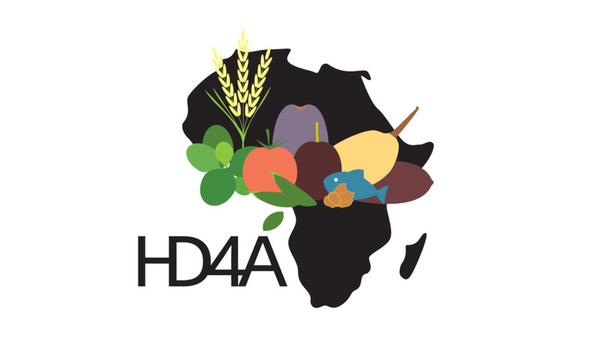
HealthyDiets4Africa
HealthyDiets4Africa is a transdisciplinary research project funded by the European Union (Horizon Europe). It aims to contribute to the transformation of food systems in Africa through diversification to make them more resilient, sustainable and climate friendly, while improving the supply of safe, nutritious, and affordable food to combat malnutrition.
Based on translational research approach, the project adopts the concept of “Living Labs” for co-creation, prototyping, testing and scaling-up of innovations in eight African countries: Liberia, Ghana, Nigeria, Benin, Ivory Coast, Cameroon, Kenya, Uganda. This is done in collaboration with various stakeholders at selected project sites towards strengthening the food systems to improve food and nutrition security. The project consortium includes 21 institutions from 12 countries in Europe and Africa.
Project coordinator:
Prof. Dr. Michael Frei, Chair of Agronomy and Crop Physiology, ZNE, JLU Giessen
Project manager:
Dr. Emmanuel Donkor, Chair of Agronomy and Crop Physiology, JLU Giessen
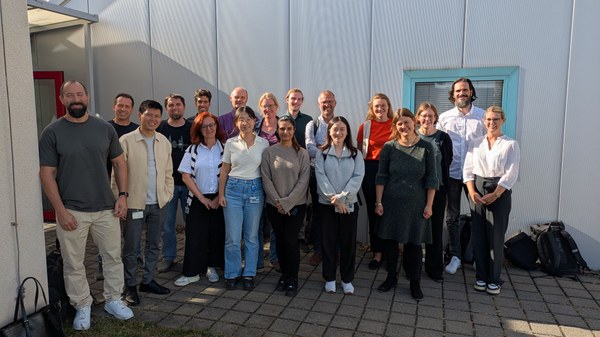
FABALOUS
FABALOUS (Faba bean abiotic stress tolerance for improved yield stability) is a research project funded by the German Federal Ministry of Research, Technology and Space (BMFTR), involving 15 partners in Germany. The project’s primary objective is to define a molecular and physiological knowledge base for the targeted breeding of climate-adapted faba beans – a legume that yields high-quality, protein-rich seeds.
Thus, the FABALOUS project addresses one of the most crucial challenges facing existing food systems: the impact of climate change. It investigates the stress response to combined heat and drought stress in the existing crop breeding pool, which should be instrumental to improve yield stability under combined environmental stresses. Additionally, the project is studying the effects of heat stress at a field scale by using a unique above-ground heat pumping facility under a field in Bad Nauheim, Germany.
Project coordinator:
Prof. Dr. Sarah-Veronika Schiessl-Weidenweber, Chair Genetics of Crop Diversity, ZNE, JLU Giessen
Find a complete list of ongoing research projects here.
Local and Global Cooperation for Food Systems Transformation
The ZNE approaches food systems research at multiple levels: regional, national and global. As such, it thrives on networks and cooperations at all levels.
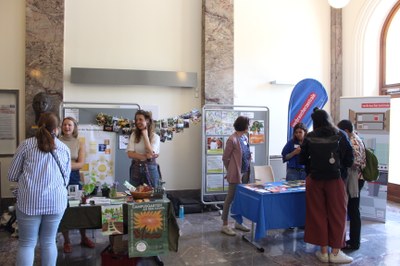 |
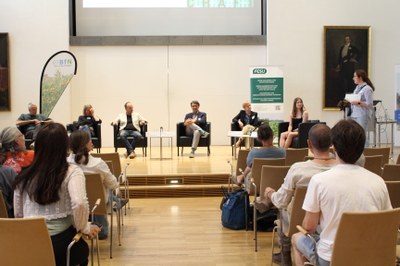 |
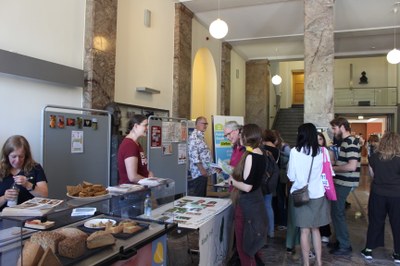 |
Transfer and Dialogue with Local Food System Actors at the Sustainability Hub
On 14 May 2025, the Sustainability Hub took place in the main university building of Justus Liebig University Giessen focusing on the topic "Enjoying Sustainably: Local Approaches to Sustainable Nutrition". Organised by the Centre for Sustainable Food Systems - ZNE and the Office for Sustainability at JLU Giessen, the event offered inspiring insights into local initiatives for sustainable nutrition.
The "Market of Opportunities" gave participants the chance to get acquainted and to connect with local associations and initiatives. Exciting concepts were presented in the impulse talks of the ZNE members and start-up representatives: Topics ranged from the agricultural systems research and sustainable consumption to socio-political dynamics, innovative start-up ideas and social innovations. The fishbowl discussion facilitated a lively debate on visions and concrete steps towards sustainable nutrition in the region of Giessen and Hesse. The focus was on the role of politics, companies, consumers and universities in promoting sustainable paths.
Find out more about the event here
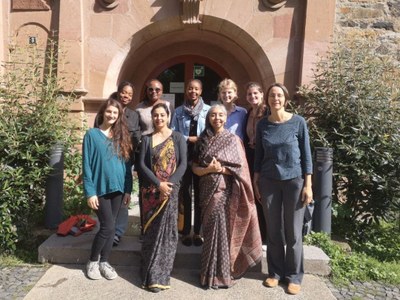 |
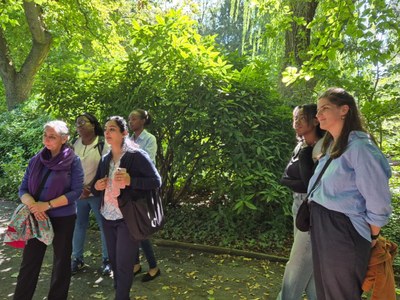 |
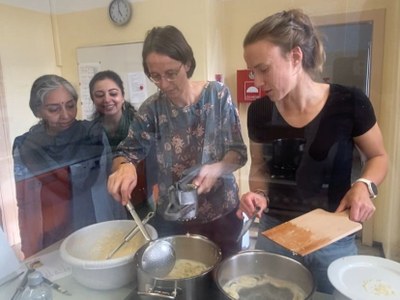 |
Researchers from India visited JLU Giessen as part of a DAAD fact-finding mission: Establishing Cooperation Between the University of Delhi and the University of Giessen on Sustainable Diets and Healthy Food Environments
In September 2025, Prof. Dr Bani Tamber Aeri and Dr Vandana Sabharwal, Assistant Professors, both from the Institute of Home Economics at the Department of Food and Nutrition, University of Delhi, visited Justus Liebig University Giessen to establish cooperation between the two universities in the field of sustainable diets and healthy food environments.
Prof. Dr. Gudrun Keding, who leads the Chair of International Food Security at JLU Giessen and is a member of the ZNE, effectively organised and facilitated the knowledge exchange between the researchers from both universities. Part of the visit was devoted to the interaction with the ZNE and its members regarding future research collaboration. Fruitful discussions revealed multiple areas of interest relating to research on sustainable food systems in both countries and beyond. We look forward to successful future collaborations with both researchers from India.
Project coordinator: Prof. Dr. Gudrun Kedung, Chair of International Food and Nutrition Security, ZNE, JLU Giessen
Read more about the visit here
Sharing Insights - Getting Involved
ZNE members are continuously involved in the publication, transfer, and teaching of insights about sustainbale food systems. Learn about a seminar to foster education for sustainable development and a conference hosted by the ZNE in November of 2025 below.
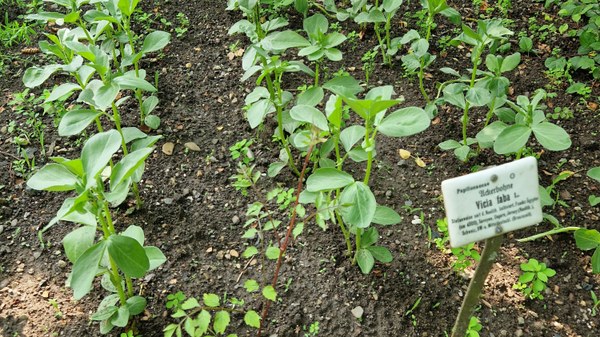
ZNE and Education for Sustainable Development (Bildung für Nachhaltige Entwicklung – BNE)
In the summer term of 2025, the ZNE contributed to an interdisciplinary seminar at university for preservice teachers (biology, mathematics), presenting a project entitled 'Field bean: the protein plant and legume for sustainable food systems'.
Taking the form of a real-world laboratory, the seminar “BNEreal: Making sustainability tangible - developing interdisciplinary learning environments for schools” was related to Education for Sustainable Development and aimed to create and test learning opportunities for school students, focusing on sustainable goals and the school subjects of biology and mathematics.
Seminar coordinators:
Prof. Dr. Katja Lengnink, Department of Mathematics, JLU Giessen
Dr. Elvira Schmidt, Institute for Biology Education, JLU Giessen
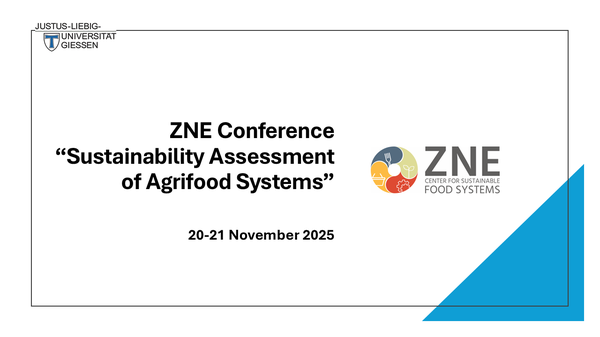
International Conference on “Sustainability Assessment of Agrifood Systems”
The Center for Sustainable Food Systems (ZNE) is organizing its first international ZNE conference on “Sustainability Assessment of Agrifood Systems”. It will take place in November 2025 at the Justus Liebig University (JLU) in Giessen.
The main objective of the conference is to discuss methodical developments in sustainability assessment, the potential of sustainability assessment approaches for the transformation of our food system and key factors affecting the development, application and dissemination of these approaches in practice. The conference will provide a valuable opportunity for interdisciplinary debate, with the participation of JLU researchers and invited scientists from around the world. The results of the conference are going to be shared and disseminated by the ZNE after the event has taken place.
Want to learn more or get involved? Visit the ZNE here or reach out to ZNE Coordinator Dr. Irina Solovieva at zne


